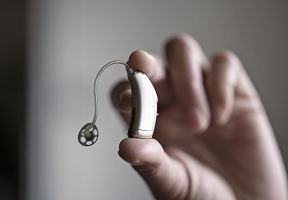

Courtesy of Esther Sciammarella
Chicago Hispanic Health Coalition
For the first time in the United States, the U.S. Food and Drug Administration is likely to clear the way for hearing aids to be sold over the counter for adults with mild to moderate hearing loss. This development could prove to be of significant importance to the Hispanic community. As such, it underscores the imperative that the FDA get this process right.
We’re still learning more about the problem of hearing loss within the Hispanic community. Roughly one of every seven Hispanics in the U.S. has some level of hearing impairment. According to the National Institutes of Health, this problem is more likely to occur among those who are over the age of 65, do not have a high school education, have diabetes or pre-diabetes, and are among the lowest income tiers. With this in mind, the Chicago Hispanic Health Coalition applauds the FDA in seeking to make certain hearing aids more affordable and easier to acquire. At the same time, the FDA’s attempt to provide increased access and affordability cannot come at the risk of compromising the safety of consumers. As currently drafted, this may unfortunately prove to be the case absent the FDA making necessary changes to the final rule.
The FDA is proposing to allow OTC hearing aids to have a maximum output level – essentially the sound volume entering the user’s ear – of 115 to 120 dB. That number doesn’t mean anything to the layman so let me put it into context. This sound level is higher than the World Health Organization and leading associations of hearing care specialists recommend for patients with mild to moderate hearing loss. The Centers for Disease Control and Prevention indicate such levels can do damage to a person’s hearing in as little as nine seconds. If these proposed regulations take effect, people who buy hearing aids in a retail store for help with their hearing impairment could, in fact, be risking the possibility of suffering increased permanent hearing damage.
The FDA’s guidance on this does not provide adequate reassurance. The agency indicates that hearing aid users will have 28 seconds to avoid any potential harm by either removing the device or lowering the volume. This is not an acceptable justification for such a high standard. First, this runs counter to the CDC’s guidance on how quickly one’s hearing can be damaged. Also, though, the FDA’s perspective here seemingly forgets the fact that consumers will be buying these hearing aids without consulting a health care professional. How will consumers know whether or not the sound output level is potentially damaging? And, if they are in their senior years, will consumers have the necessary dexterity and cognitive ability to react so quickly? This is far from clear, and the FDA offers no studies or information to support what appears to be an attempt at placing the onus of ensuring consumer safety on consumers themselves.
We are of the position that the FDA should lower the maximum output level for over the counter hearing aids to a standard that is indisputably safe and doesn’t put the user at undue risk. Hearing care associations have provided recommendations on this matter and the agency should heed them. Specifically, the four professional associations representing providers who treat patients with hearing loss all recommend the FDA limit output to 110 dB SPL and establish a gain limit of 25 dB. We strongly support these recommendations because consumer safety should be the top priority as the FDA develops the final rule.
In addition to our recommendations on the levels of gain/output, we also want to stress the importance of requiring multi-lingual labeling. Currently, the FDA has only ruled to include the Spanish language on certain devices, however, there are between 350-430 different languages spoken in the United States alone.[1] By providing multi-lingual labeling on devices, we would reduce the limitations of lingual challenges and better serve patients in all households.
We appreciate your consideration of these comments. We look forward to the FDA developing a final rule that more adequately ensures OTC hearing aids will not put consumers at an increased risk of experiencing hearing loss by the very medical devices they seek to use in helping address their medical condition.









